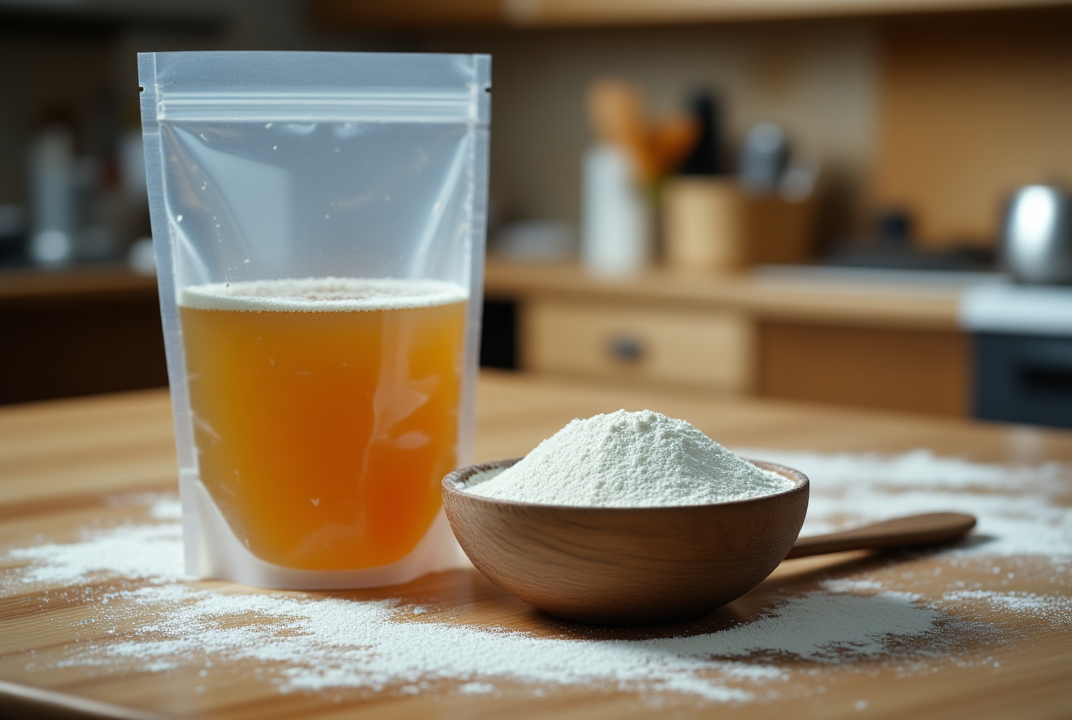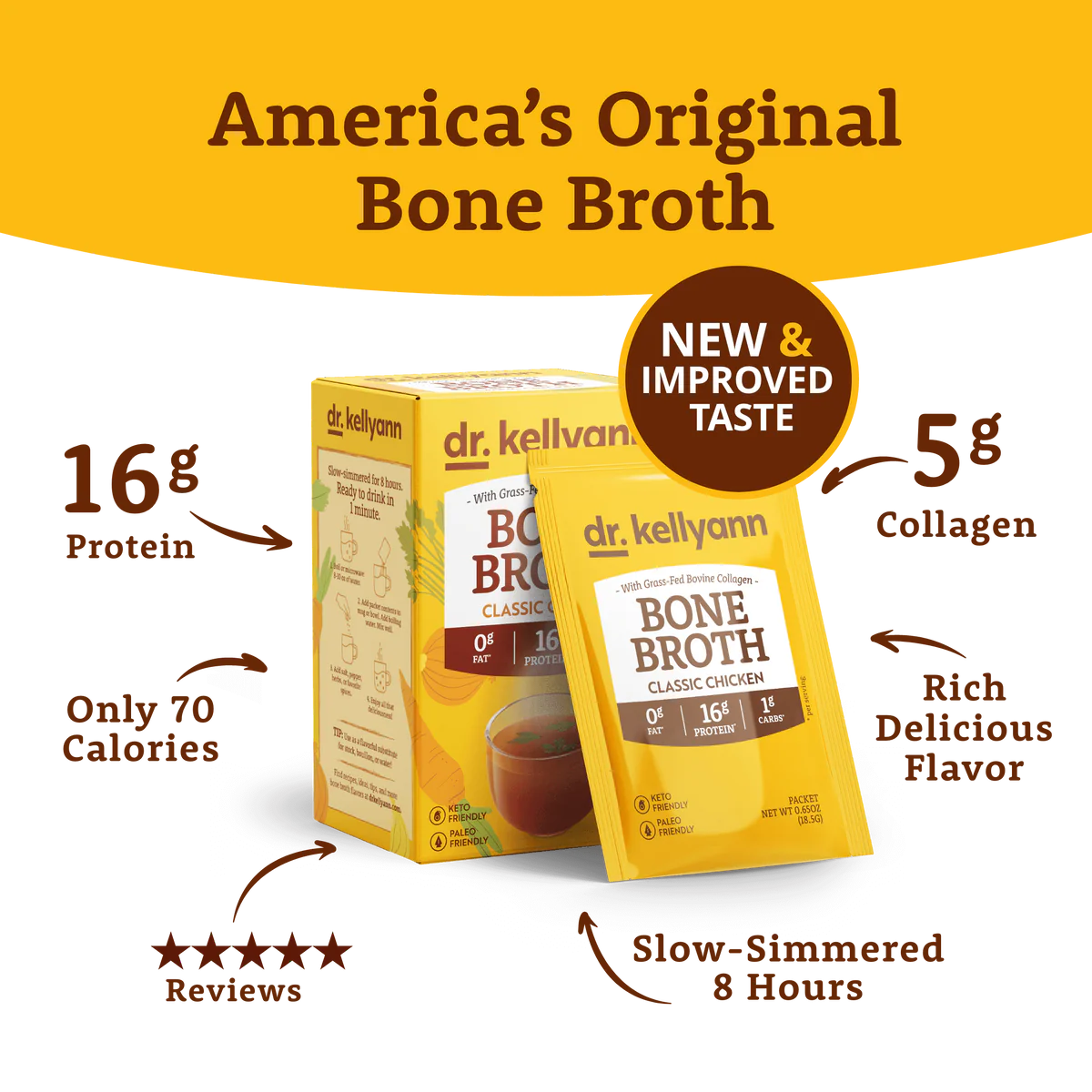
If you’re committed to feeling your best—inside and out—you’ve likely encountered the debate between bone broth and collagen. Both are celebrated for their roles in supporting skin elasticity, joint comfort, and digestive wellness, but which one truly fits your needs? In this article, we’ll compare bone broth and collagen head-to-head, offering clear, evidence-based insights to help you confidently choose the supplement that matches your wellness journey.
What Is Bone Broth?
Bone broth is a nutrient-rich liquid made by simmering animal bones—often with connective tissues, herbs, and vegetables—for an extended period, typically 12 to 24 hours. This slow cooking process extracts valuable compounds like collagen, gelatin, amino acids, and minerals such as calcium, magnesium, and phosphorus, resulting in a savory, nourishing broth. Traditionally valued for its comforting flavor and restorative properties, bone broth is now celebrated for its potential benefits to joint health, gut integrity, skin elasticity, and overall wellness, making it a staple in many health-conscious and specialty diets.
What Is Collagen?
Collagen is the most abundant protein in the human body, serving as a structural foundation for skin, bones, tendons, ligaments, and connective tissues. In supplement form, collagen is typically derived from animal sources such as bovine hides or fish skin, and is hydrolyzed—broken down into smaller, easily absorbed peptides. Unlike bone broth, which contains a variety of nutrients, collagen supplements are concentrated sources of specific amino acids like glycine, proline, and hydroxyproline, which are essential for maintaining skin elasticity, joint health, and strong hair and nails. Collagen’s targeted support makes it a popular choice for those seeking to enhance their body’s natural repair and anti-aging processes.

Bone Broth vs Collagen: What’s The Difference?
Source and Composition
- Bone Broth: Made by simmering animal bones, connective tissues, and sometimes vegetables for many hours, resulting in a nutrient-dense liquid. Contains collagen, gelatin, amino acids, minerals, and other compounds extracted from bones and tissues.
- Collagen: A purified protein supplement, usually sourced from bovine, marine, or poultry collagen. It is hydrolyzed into peptides for easy absorption and contains concentrated amounts of specific amino acids but lacks the broader nutrient profile of bone broth.
Nutritional Profile
- Bone Broth: Offers a wide range of nutrients, including collagen, gelatin, glucosamine, chondroitin, electrolytes, and trace minerals. Also contains small amounts of protein and may include vitamins from added vegetables.
- Collagen: Primarily provides protein in the form of collagen peptides, focusing on amino acids like glycine, proline, and hydroxyproline. Does not contain minerals, gelatin, or other nutrients found in bone broth.
Health Benefits
- Bone Broth: Supports joint health, gut lining, immune function, and hydration due to its diverse nutrient content. The gelatin and minerals may aid digestion and recovery.
- Collagen: Specifically targets skin elasticity, joint comfort, hair and nail strength, and muscle recovery by supplying the building blocks for connective tissue repair and regeneration.
Taste and Versatility
- Bone Broth: Has a savory, rich flavor and can be enjoyed as a warm beverage, soup base, or cooking liquid. Adds depth to recipes but may not suit all palates.
- Collagen: Flavorless and odorless in supplement form, making it easy to mix into coffee, smoothies, or baked goods without altering taste or texture.
Use Cases
- Bone Broth: Ideal for those seeking a whole-food source of nutrients, comfort during recovery, or a flavorful addition to meals.
- Collagen: Best for individuals looking for a convenient, concentrated protein supplement to support skin, joints, and overall connective tissue health.
How Much Collagen Is In Bone Broth?
The collagen content in bone broth can vary widely depending on the type of bones used, the cooking time, and the preparation method, but on average, an 8-ounce (1-cup) serving typically contains between 5 to 10 grams of collagen protein. Unlike standardized collagen supplements, bone broth’s collagen levels are not precisely measured, and the final amount can fluctuate based on factors like bone-to-water ratio and simmering duration. While bone broth is a natural source of collagen, those seeking a consistent and concentrated dose may prefer collagen supplements, which are specifically formulated to deliver a set amount of collagen per serving.
Does Collagen Have More Protein Than Bone Broth?
Yes, collagen supplements generally contain more protein per serving than bone broth. A typical serving of collagen peptides provides around 10 to 20 grams of pure protein, whereas an equivalent serving of bone broth usually offers 5 to 10 grams of protein, much of which comes from collagen and gelatin. Collagen supplements are highly concentrated and standardized, making it easier to achieve higher protein intake for targeted benefits like joint, skin, and muscle support. In contrast, bone broth delivers a broader range of nutrients but with a lower and more variable protein content per serving.
What Is The Daily Recommended Intake For Both?
There is no official daily recommended intake for bone broth or collagen, as individual needs can vary based on health goals, diet, and activity level. However, most experts suggest consuming 1 to 2 servings of bone broth per day—typically 8 to 16 ounces—to support general wellness, gut health, and joint function. For collagen supplements, a common dosage ranges from 10 to 20 grams of collagen peptides daily, which is considered effective for promoting skin elasticity, joint comfort, and connective tissue repair. It’s always best to consult with a healthcare professional to determine the optimal amount for your unique needs and to ensure it fits well within your overall nutrition plan.
How Does The Nutritional Value Compare Between Bone Broth and Collagen?
|
Nutrient/Aspect |
Bone Broth |
Collagen Supplement |
|
Protein Content |
5–10g per serving (varies) |
10–20g per serving (standardized) |
|
Collagen |
Present, amount varies by batch |
Highly concentrated, consistent dosage |
|
Gelatin |
Present (from slow simmering) |
Not present (hydrolyzed form only) |
|
Amino Acids |
Broad spectrum, including glycine, proline |
High in glycine, proline, hydroxyproline |
|
Minerals |
Contains calcium, magnesium, phosphorus, etc. |
Minimal to none |
|
Other Nutrients |
May include glucosamine, chondroitin, electrolytes |
Not present |
|
Flavor |
Savory, rich, can be used in cooking |
Flavorless, easy to mix into any beverage |
|
Convenience |
Requires preparation or purchase of liquid |
Quick, portable powder or capsule |
|
Versatility |
Used as a beverage, soup base, or in recipes |
Mixes into drinks, smoothies, or recipes |
Which One Is Right For Me Bone Broth or Collagen?
- For Whole-Food Nutrition: Choose bone broth if you prefer a natural, whole-food source of nutrients, including minerals, gelatin, and amino acids, along with collagen.
- For Concentrated Protein: Opt for collagen supplements if you want a higher, more consistent dose of protein and collagen peptides for targeted support of skin, joints, and muscles.
- For Culinary Use: Bone broth is ideal if you enjoy cooking and want a savory, nutrient-rich base for soups, stews, or sipping as a warm beverage.
- For Convenience: Collagen supplements are best if you need a quick, flavorless option that easily mixes into coffee, smoothies, or recipes without altering taste.
- For Specific Health Goals: Select bone broth for gut and immune support, or collagen if your primary focus is on anti-aging, skin elasticity, and connective tissue repair.
Conclusion
Both bone broth and collagen offer unique benefits, and the right choice ultimately depends on your individual health goals, lifestyle, and preferences. Bone broth provides a nourishing, whole-food source of collagen along with minerals, gelatin, and other nutrients that support gut, joint, and immune health. Collagen supplements, on the other hand, deliver a concentrated, convenient dose of protein and specific amino acids ideal for those seeking targeted support for skin, hair, nails, and connective tissue. Whether you choose one or incorporate both into your routine, understanding their differences empowers you to make informed decisions that align with your wellness journey.
Final Thoughts
Wondering how to easily incorporate collagen-rich nutrition into your daily routine? Dr. Kellyann’s bestsellers include flavorful chicken, beef, and french onion bone broths, all crafted without GMOs or added sugars. These nourishing broths offer a convenient and tasty way to support your wellness journey. Visit Dr. Kellyann’s collection to find your ideal match.
Sources
- https://behavioralnutrition.org/collagen-101/
- https://www.healthline.com/nutrition/bone-broth
- https://www.uclahealth.org/news/article/should-you-take-collagen-supplements




